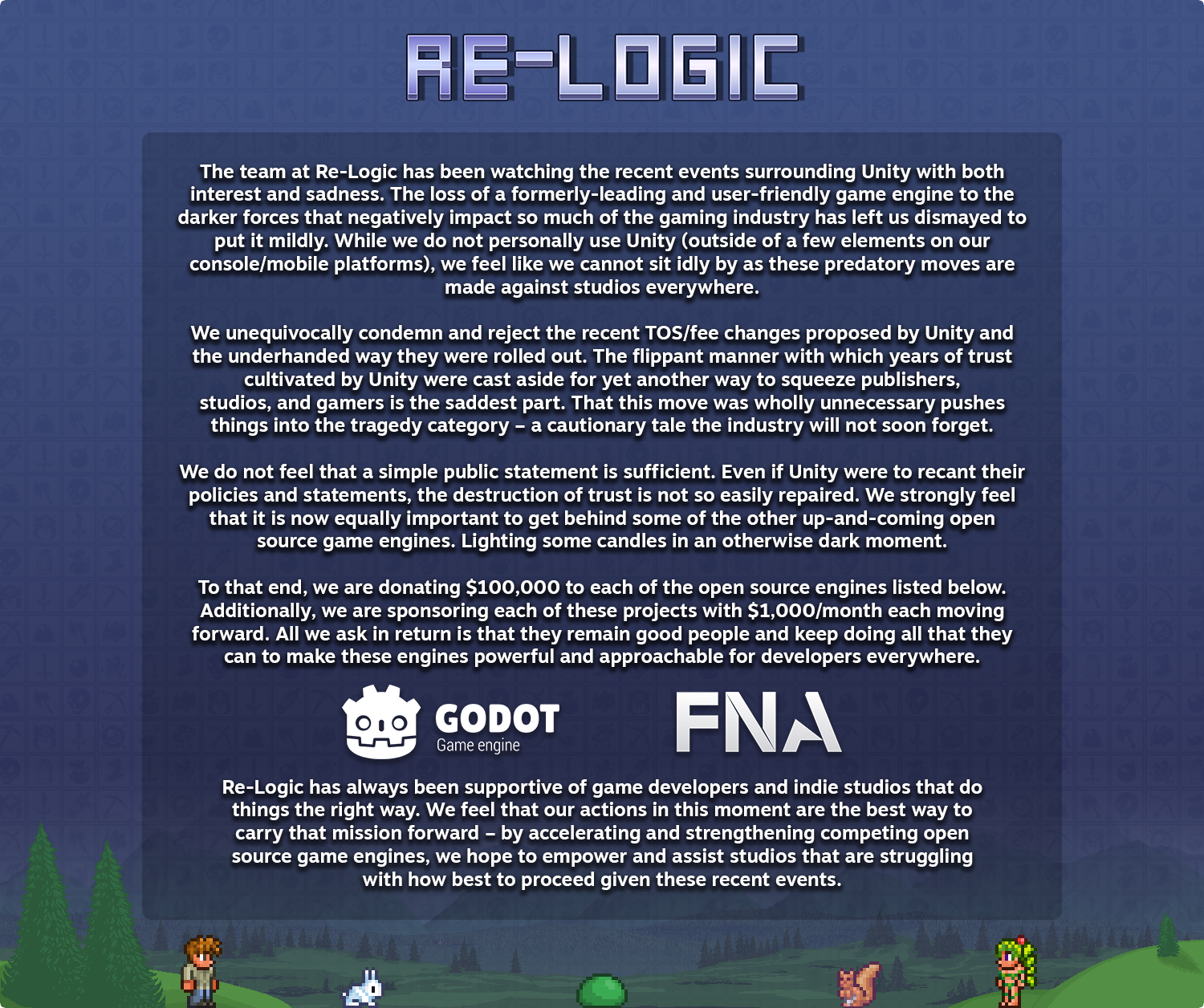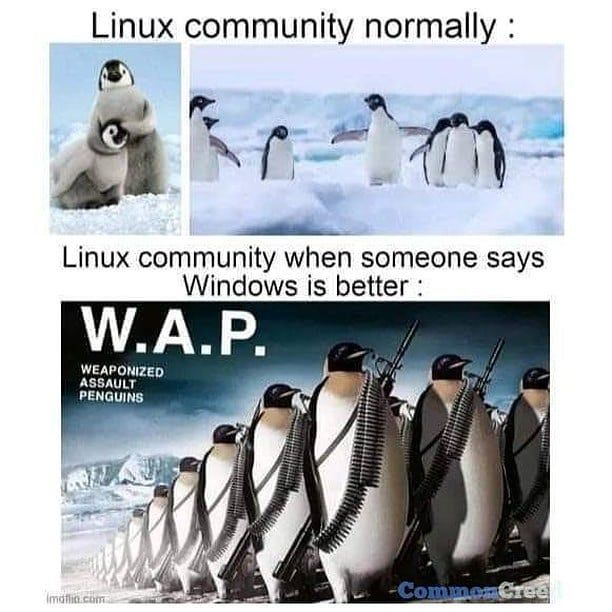- cross-posted to:
- tech_memes@lemmy.world
- cross-posted to:
- tech_memes@lemmy.world
Also checkout my new community: !tech_memes@lemmy.world
Eh. One thing proprietary software has going for it is clear design goals and the leadership to create a cohesive UX. Open source projects tend to be a grab bag of tools that work well for developers.
Not saying I don’t love FOSS, but there’s definitely stuff that proprietary software does better in a practical sense, whatever else your opinion of it.
Foss struggles to get dev time. If everything was foss, we could coordinate easier.
I am a designer with 20 years of experience. I’ve tried contributing to FOSS, but the developers are incredibly stubborn and work purely guided by their own assumptions. Hence the horrible UX on so much FOSS. There are more than enough design people that would love to contribute, but are met with nothing but ridicule and insults.
Time for yet another fork
That has not much do to with FOSS but with the people you are working with. Proprietary software you can’t even contribute freely to begin with
This has been my experience as well but as a coder.
I can’t count the number of contributions I’ve made, many of them minor. I’m talking 20-30 lines of code max.
I can count on two hands the number that have been either accepted or declined for a legitimate reason.
Counterpoint - if everything was FOSS it would be absolute chaos with no direction, conflicting goals, incomplete projects, and limited oversight… and also lots of inter-dev-team drama and forking.
For instance…
it would be absolute chaos with no direction, conflicting goals, incomplete projects, and limited oversight
You are describing the current scenario where everything is proprietary
That looks fun.
Some of these projects split from their parent branches for technical reasons… and some of them for not-so-technical reasons.
Everybody likes forking…
cohesive
gestures to MS products for the last 20 years
gestures to Windows’ disk partitioner

Fair dues, Microsoft managed to fuck that up in spite of itself.
That is not a feature of proprietary software. That is a feature of an organisation. It only makes sense to make software for a profit in an organisation, so that’s why there’s so many of those. FOSS also has a lot of organisations, which are also pretty often used btw, but they are not required.
Not having to rely on an approval by any entity is a big thing for people fucking around with stuff. And fucking around with stuff makes one good at that stuff.
I don’t disagree that it is a feature of organization, but if you’re talking about creating a product that has been designed around a common philosophy and UX, that is diametrically opposed to fucking around with stuff. There’s a place for that and it does improve people’s skills, I also don’t disagree there. All I’m saying is there exists a tendency for software produced by organizations to adhere to a UX philosophy.
Yeah, I got a bit too into my own head. I do agree with that.
You can have OSS without the F
There’s a very good reasons why people and organisations will pay for proprietary software when there is a free alternative available. I’ve used FOSS word processors before, for example, and they’re okay, but nothing like what Microsoft Office can do. Same with video editing.
There’s a very good reasons why people and organisations will pay for proprietary software when there is a free alternative available.
Yup… risk transfer
Pay somebody else to take responsibility for pieces of your business process, then blame them when something goes wrong - that’s why we have a contract.
Also just making their employees more productive.
There’s a very good reasons why people and organisations will pay for proprietary software when there is a free alternative available.
And there are also very good reasons why people and organisations are stopping relying on proprietary software and switching to open alternatives that won’t lock them up.

As someone who uses Gnome familly applications daily, I have to disagree with the notion that bad UX is fundamental to FOSS software. The gnome apps and shell all follow the same set of UX guidelines and feel quite cohesive as a result. I can definetly see where you get the idea of bad UX in foss though (looking at you, GIMP and Libreoffice)
I’m not saying it’s fundamental, sorry, I should have specified. You’re exactly right, GNOME is driven by it’s Foundation and so there is leadership in place to make sure that the software ends up as a cohesive whole. Software projects that don’t, or that create one after the fact, tend to be a lot less so.
Not to mention the Customer/Service Suppport, that is at enterprise level because regular customer support is … well you all know already.
Removed by mod
If you’re going to be an asshole about it, pick something other than Blender. That is one of the best examples of how organizations produce cohesive software that adheres to design standards with the express purpose of making it user friendly. User friendly is not the same as easy. It means ‘respect the user’, not ‘fisher price’.
You’re espousing the exact attitude that drives people away from contributing to FOSS to solve problems so please crawl into a deep hole and spam neofetch on your Arch Thinkpad, cretin.
Cries in CAD
FreeCAD is 1.0 now released, in case you haven’t heard the news.
Small steps, and still far and away from the thousands of dollars a year programs but the future is bright in this space!
they made Canadian money free?? count me in
Hm maybe I’ll check ot out again someday, but being able to use professional CAD it’s so much of a difference in productivity that it feels really bad.

deleted by creator
Not cool, mate

This one is missing all of the penguins being insufferable people, in both frames.
substance painter proprietary file formats. PROPRIETARY FILE FORMATS.
This isn’t even a meme wtf
A meme (/miːm/ ⓘ; MEEM) is an idea, behavior, or style that spreads by means of imitation from person to person within a culture and often carries symbolic meaning representing a particular phenomenon or theme.
https://en.wikipedia.org/wiki/Meme
In conclusion, it is a meme.
An Internet meme, or meme (/miːm/, “MEEM”), is a cultural item (such as an idea, behavior, or style) that spreads across the Internet, primarily through social media platforms like YouTube, Twitter, and Reddit. Internet memes manifest in a variety of formats, including images, videos, GIFs, and other viral content. Key characteristics of memes include their tendency to be parodied, their use of intertextuality, their viral dissemination, and their continual evolution.
https://en.m.wikipedia.org/wiki/Internet_meme
In conclusion, it is a meme, but it’s debatable how much of a meme it actually is.
Blasé Caesar voice: “What is a meme?”
Nahman, I‘m pretty sure Chicago would still be Chicago
Nah, people would still vote for someone who wants the opposite…
What happened to my needs being primary and the device being secondary, serving me? The device is not primary, it does not have rights. Sales is transferring rights from one person or entity to another, for their use, no strings attached. We have completely upended the primary idea of commerce.
Perhaps some Ferengi-style Rules of Acquisition are in order. And some kind of death penalty for CEOs may help.
Someday…
Like lions and gazelles living in harmony. Never will happen. Nor should it.
If capitalism didn’t exist, we would have free, infinite electricity courtesy of Nikola Tesla.











